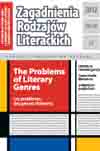Liberatura wobec rekonfiguracji aisthesis
Liberature in Relation to the Reconfiguration of Aisthesis
Author(s): Irena GórskaSubject(s): Literary Texts
Published by: Łódzkie Towarzystwo Naukowe
Keywords: aisthesis; liberature; Wolfgang Welsch; new aesthetics; polysensory perception; aesthetic experience
Summary/Abstract: This article proposes to inspect the phenomenon of liberature from the perspective of the reconfiguration of aisthesis, as described by Wolfgang Welsch. In the German researcher’s approach, this consists in the questioning of the primacy of vision in favour of other senses, and is, first of all, an effect of the dominance of the media. However, in a broader approach towards the reasons of transformations, aisthesis must be looked for in phenomena that are summarised in the formula of „new aesthetics”, as proposed by Arnold Berleant. One of the significant features of this concept is the constant expansion of the area of art and the appearance of forms that stimulate the audience experience, requiring the switching on of new sensory receptors. Without a doubt, liberature is one of those forms of art that require interactivity and a special involvement. Being a unique example of the co-existence of various types of messages (verbal, iconic and material), liberature requires a polysensory perception. This, in turn, can be a source of aesthetic satisfaction, but also a reason for an impoverishment of the aesthetic experience spanning between aisthesis and anaisthesis.
Journal: Zagadnienia Rodzajów Literackich
- Issue Year: 55/2012
- Issue No: 2
- Page Range: 217-232
- Page Count: 16
- Language: Polish

